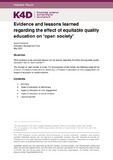| dc.contributor.author | Fieldsend, Astrid | |
| dc.date.accessioned | 2021-07-01T11:47:24Z | |
| dc.date.available | 2021-07-01T11:47:24Z | |
| dc.date.issued | 2021-05 | |
| dc.identifier.citation | Fieldsend, A. (2021). Evidence on the effect of equitable quality education on open society. K4D Helpdesk Report. Brighton, UK: Institute of Development Studies. DOI: 10.19088/K4D.2021.094 | en |
| dc.identifier.uri | https://opendocs.ids.ac.uk/opendocs/handle/20.500.12413/16723 | |
| dc.description.abstract | The purpose of this review is to assist FCDO in understanding the evidence of impact and any valuable lessons regarding the effect equitable quality education can have on ‘open society’. The search revealed that there is a considerable volume of evidence which focuses on education’s ability to reduce poverty, increase economic growth, boost employability and achieve better health outcomes. There is less which focuses on the aspects of ‘open society’ as defined in this paper. The scope of this review was narrowed to focus upon areas of the ‘open society’ definition where the most evidence does exist, given the timeframe for the review. The scope was narrowed to focus on: democracy, civic engagement, and social cohesion. The review of the literature found strong evidence that equitable quality education can have a range of positive impacts on democracy (specifically, its institutions and processes), civic engagement and social cohesion. There is a considerable body of evidence which indicates that there is a correlation between equitable quality education and benefits to societies (more peaceful, higher levels of trust, greater participation in politics, etc). However, there was no clear evidence that investment in equitable quality education directly leads to positive societal outcomes. This is because there are so many other factors to account for in attempting to prove causation. The lack of rigorous studies which attempt to attribute causation demonstrates a clear evidence gap. It is important to note that education systems themselves are politicised and cannot be divorced from the political process. The extent to which education can impact positively on open society depends a great deal on the value education has within the political system in which it is operating. | en |
| dc.description.sponsorship | FCDO (Foreign, Commonwealth and Development Office) | en |
| dc.language.iso | en | en |
| dc.publisher | Institute of Development Studies | en |
| dc.relation.ispartofseries | K4D Helpdesk Report;1011 | |
| dc.rights.uri | https://www.nationalarchives.gov.uk/doc/open-government-licence/version/3/ | en |
| dc.subject | Development Policy | en |
| dc.subject | Education | en |
| dc.subject | Governance | en |
| dc.subject | Rights | en |
| dc.title | Evidence and Lessons Learned Regarding the Effect of Equitable Quality Education on ‘Open Society’ | en |
| dc.type | Helpdesk | en |
| dc.rights.holder | © Crown copyright 2021 | en |
| dc.identifier.doi | 10.19088/K4D.2021.094 | |
| dcterms.dateAccepted | 2021-05 | |
| rioxxterms.funder | Default funder | en |
| rioxxterms.identifier.project | Default project | en |
| rioxxterms.version | VoR | en |
| rioxxterms.versionofrecord | 10.19088/K4D.2021.094 | en |
| rioxxterms.funder.project | 9ce4e4dc-26e9-4d78-96e9-15e4dcac0642 | en |

